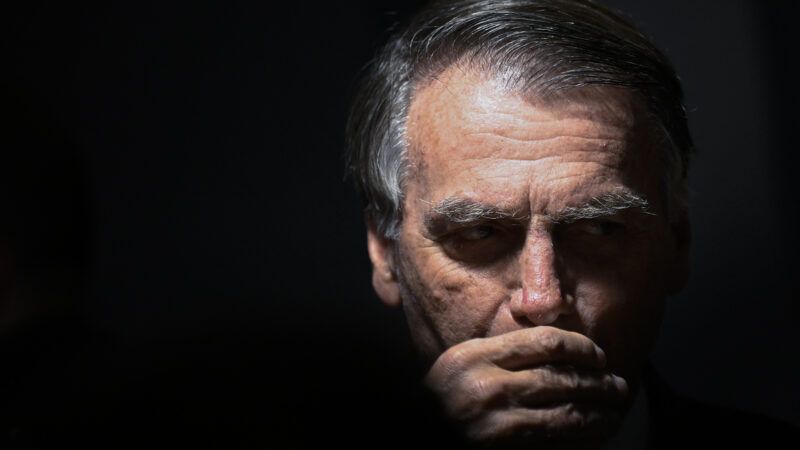Brazil's Democracy Is Not Safer After Bolsonaro's Conviction
The unprecedented conviction of the former president is reshaping Brazilian politics.

Brazil had its own January 6 in 2023, when hundreds of former President Jair Bolsonaro's supporters stormed Congress, the Supreme Court, and the presidential palace in Brasília. They were protesting Luiz Inácio Lula da Silva's presidential election victory. Nearly three years later, the Supreme Federal Court—the country's constitutional court—has sentenced Bolsonaro to 27 years in prison for allegedly plotting a coup.
The case began after police discovered a draft decree in the house of Bolsonaro's justice minister that would have annulled the 2022 election and placed Brazil's electoral authority under emergency rule. Testimony and phone records indicated that Bolsonaro reviewed the document and pressed military commanders to intervene.
Prosecutors accused Bolsonaro of leading a network that spread disinformation, courted the armed forces, financed protest camps, and tolerated plots of political violence.
Bolsonaro's trial has become a flashpoint, often compared to the January 6 riot in the U.S. Capitol, when a mob stormed the building as Congress certified Joe Biden's presidential election win. But Brazil's institutions don't map neatly onto America's. Unlike in the U.S., Brazil has a dedicated electoral court that regulates campaigns, while its Supreme Federal Court can both initiate investigations and judge the same defendants.
That concentration of investigative and adjudicative powers is different from the U.S. Supreme Court, says attorney Leonardo Corrêa, president of Lexum, an association of Brazilian legal scholars. In his view, President Donald Trump confronted "a system that resists personalism; Bolsonaro [was] judged by institutions that absorb and amplify it. The former struggles against the machine; the latter is prosecuted by a machine that has forgotten its limits."
Trump, who has cast Bolsonaro as a political ally, called the trial a "witch hunt." The White House responded with 50 percent tariffs on Brazilian imports and sanctions against Justice Alexandre de Moraes—a central figure in Bolsonaro's prosecution—under the Global Magnitsky Human Rights Accountability Act, freezing his assets and stripping his U.S. visa.
Bolsonaro denied leading a coup but, in June 2025 testimony, admitted to holding "conversations" with commanders and ministers about post-election "constitutional alternatives"—including extraordinary measures such as a state of siege, as reported by the Brazilian financial news website InfoMoney. On September 11, a five-member panel of Brazil's Supreme Federal Court convicted him on five counts, including "taking part in an armed criminal organization; attempting to violently abolish democracy; organizing a coup; and damaging government property and protected cultural assets," according to NBC News. Several allies received sentences of up to 26 years.
For some Brazilians, Bolsonaro's sentence stokes fears of creeping authoritarianism; for others, it confirms suspicions that the Supreme Federal Court is exceeding its constitutional limits. Brazilian lawyer João Ferreira tells Reason, "Unfortunately, we're witnessing a political, not a legal, trial. And with the U.S. attention on our situation, I fear next year's elections won't even be recognized. It would be a disaster for us."
A Genial/Quaest poll found Brazilians trust the Catholic church (73 percent) and the armed forces (70 percent) far more than they trust the Supreme Federal Court (50 percent), Congress (45 percent), or political parties (36 percent). The court's handling of the case "only accelerates the ongoing erosion of our democracy," says lawyer and political commentator Carol Sponza, pointing to "a Supreme Court justice sanctioned under the Magnitsky Act and a Senate that fails to perform its checks-and-balances role" as proof that "the institutions are not functioning properly."
Magno Karl, a political scientist and executive director of Livres, a Brazilian liberal political movement, says the country faces a paradox: "It strengthens democracy to prosecute people who conspire against it, but the extraordinary powers the Supreme Court claims to defend democracy have not always been used wisely…they have been used to silence critics."
For now, none of the sentences will be enforced. Brazil's appeals process allows challenges that could delay imprisonment for years, and Bolsonaro's lawyers plan to appeal both domestically and internationally.
Still, the conviction blocks Bolsonaro and his allies from holding public office ever again. That makes him both sidelined and politically useful. "Without the former president's blessing, no right-wing party will land a candidate for the Senate," says Sponza. Karl adds that Bolsonaro "will be seen by many as someone treated unfairly, someone who didn't deserve prison because he never actually overthrew the government—he didn't mobilize the army, there were no tanks in the street," despite the evidence presented against him.
"Even if he becomes a myth, people will move on. His legacy will remain, but more as a symbol than as a set of ideas," Karl adds. Bolsonaro "has four kids in politics, they will carry [his legacy] forward. Politics will move on. Life will continue. Next year there will be elections, and the Brazilian right will have a future beyond Bolsonaro."


Show Comments (24)